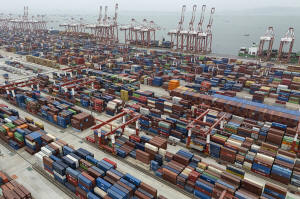Trump's tariffs loom over the economy as shipments from China fall
[April 30, 2025] By
PAUL WISEMAN, ANNE D'INNOCENZIO and CHRISTOPHER RUGABER
WASHINGTON (AP) — American businesses are cancelling orders from China,
postponing expansion plans and hunkering down to see what trade policy
surprises President Donald Trump plans to spring on them next.
The president’s massive and unpredictable taxes on imports seem likely
to mean emptier shelves and higher prices for American shoppers, perhaps
within weeks.
And the higher costs and paralyzing uncertainty could exact an economic
toll: U.S. consumers are in the biggest funk since COVID-19 hit five
years ago, and economists say recession risks are climbing.
An early sign of the damage is expected to emerge on Wednesday when the
Commerce Department releases its first look at first-quarter economic
growth.
The economy is forecast to have expanded at an annual pace of just 0.8%
from January through March, according to a survey of economists by the
data firm FactSet. That would be the slowest quarter of growth in nearly
three years and would be down from a healthy 2.4% in the last three
months of 2024. Many economists suspect things were even worse.
Asked how much of deterioration in the world’s biggest economy could be
traced to Trump’s erratic policies, Boston College economist Brian
Bethune said: “All of it.’’
As he promised on the campaign trail, Trump has upended decades of
American trade policy. He’s been imposing — then sometimes suspending —
big import taxes, or tariffs, on a wide range of targets. He’s currently
plastered a 10% levy on products from almost every country in the world.
He’s hit China — America’s third-biggest trading partner and
second-biggest source of imported goods – with a staggering 145% tariff.

China has responded with retaliatory tariffs of its own – 125% on
American products. The take-no-prisoners trade war between the world’s
two biggest economies has shaken global financial markets and threatened
to bring U.S.-China trade to a standstill.
Gene Seroka, executive director of the Port of Los Angeles, warned last
Thursday within two weeks arrivals to the port “will drop by 35% as
essentially all shipments out of China for major retailers and
manufacturers has ceased.’’ Seroka added that cargo from Southeast Asia
also “is much softer than normal with tariffs now in place.’’
After Trump announced expansive tariffs in early April, ocean container
bookings from China to the United States dropped 60% -- and stayed
there, said Ryan Petersen, founder and CEO of Flexport, a San Francisco
company that helps companies ship cargo around the world. With orders
down, ocean carriers have reduced their capacity by cancelling 25% of
their sailings, Flexport said.
Many companies tried to beat the clock by bringing in foreign goods
before Trump’s tariffs took effect. In fact, that is a big reason that
first-quarter economic growth is expected to come in so low: A surge in
imports swelled the trade deficit, which weighs on growth.
By stockpiling goods ahead of the trade war, many companies “will be
positioned to ride out this storm for a while,’’ said Judah Levine,
research director at the global freight-booking platform Freightos. “But
at a certain point, inventories will run down.’’
In the next few weeks, Levine said, “you could start seeing shortages
... it’s likely to be concentrated in categories where the U.S. is
heavily dependent on Chinese manufacturing and there aren’t a lot of
alternatives and certainly quick alternatives.’’ Among them: furniture,
baby products and plastic goods, including toys.
Jay Foreman, CEO of toymaker Basic Fun, said he paused shipments of
Tonka trucks, Care Bears and other toys from China after Trump’s tariff
plan was announced in early April. Now, he’s hoping to get by for a few
months on inventory he’s stockpiled.
“Consumers will find Basic Fun toys in stores for a month or two but
very quickly we will be out of stock and stock product will disappear
from store shelves, ” he said.

[to top of second column] |

Shipping containers are seen ready for transport at the Guangzhou
Port in the Nansha district in southern China's Guangdong province,
April 17, 2025. (AP Photo/Ng Han Guan, File)
 Kevin Brusky, who owns APE Games, a
small tabletop game publisher in St. Louis, has about 7,000 copies
of three different games sitting in a warehouse in China. The tariff
bill of about $25,000 would wipe out his profit on the games, so he
is launching a Kickstarter campaign next week to help defray the
cost of the duties.
Still, his sales representative is urging him to import the games if
possible, because he expects that retailers will soon be desperate
for products to sell. If he does import the games, Brusky is
considering raising its price from $40 to at least $45.
Worried that tariffs will push up prices and drive away customer,
retailers have put expansion plans on hold for next year, said
Naveen Jaggi, president of retail advisory services in the Americas
for real-estate firm JLL. “What they are telling us is: ‘We want to
slow down the decision to open up stores and commit to leases’
because they want to watch how the consumer reacts.’’
Consumers already seem to be freaking out. The Conference Board, a
business group, reported Tuesday that Americans’ confidence in the
economy fell for the fifth straight month to the lowest level since
the onset of the COVID-19 pandemic. Nearly one-third of consumers
expect hiring to slow in the coming months, nearly matching the
level reached in April 2009, when the economy was mired in the Great
Recession.
Consumer spending accounts for about 70% of U.S. GDP so if nervous
consumers stop shopping, the economic fallout could get ugly.
Economist Joseph Brusuelas of the consultancy RSM pegs the
probability of a recession within the next 12 months at 55%.
Even gloomier is Torsten Slok, chief economist at Apollo Global
Management. He sees a 90% chance of a recession by this summer if
Trump’s tariffs remain in place. Businesses are already planning on
significant disruptions, particularly from the 145% duties on goods
from China, he said.
“You see that in company reactions: Orders are down, (spending)
plans are down, costs are up, prices paid are up,” he said.
He expects large layoffs by trucking firms and retailers as soon as
late May, as the slowdown in goods coming into U.S. ports from China
works its way through the supply chain.
Flexport CEO Petersen said shortages of products are “not a
tragedy."
“It’s going to be much more about the layoffs that follow,” Petersen
said. "That’s where the real pain is going to be felt. Shortages
mean companies aren’t selling stuff and therefore don’t have the
profits that they need to pay their workers.’’

He said the stakes are so high that he expects the U.S. and China to
deescalate their trade war and bring down the tariffs. In fact,
Trump and his advisers have sounded more conciliatory lately.
Treasury Secretary Scott Bessent, for example, said that the
triple-digit tariffs the U.S. and China have slapped on each other
are not sustainable.
But more abrupt shifts in trade policy risk increasing the
uncertainty that has paralyzed businesses and worried consumers.
Moreover, said economist Cory Stahle of the Indeed Hiring Lab,
“conditions may worsen in the coming months if people start behaving
like they are in a recession. Softening some of the recent trade
policy changes may ease some business concerns, but it may already
be too late.’’
___
D'Innocenzio reported from New York
All contents © copyright 2025 Associated Press. All rights reserved |